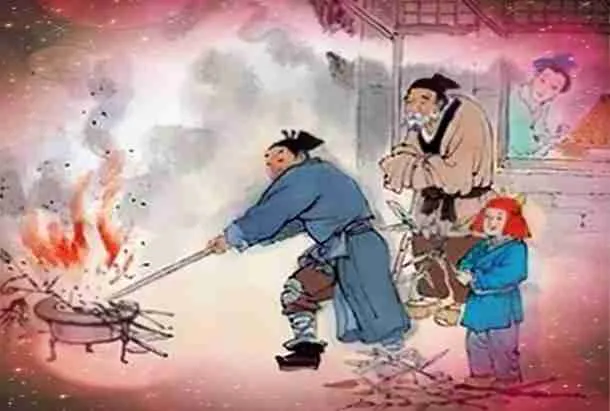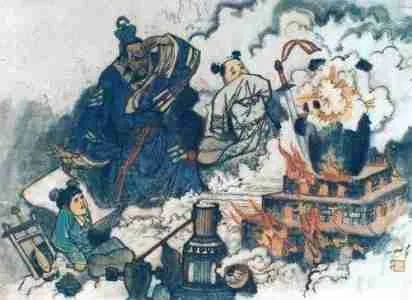The importance of gunpowder in ancient China was predominantly manifested across several domains, including military, technology, culture, and economy. In this article, we will delve into why gunpowder held such significance in ancient China and explore its diverse impacts across various fields.
when was gunpowder invented in ancient china
Gunpowder, a remarkable invention, can be traced back to the ancient Chinese Spring and Autumn Period, where the rise of alchemy laid the foundation for its birth. However, the true invention and application of gunpowder occurred during the Sui and Tang dynasties.

As early as the 7th century AD, ancient Chinese alchemists, in their quest for elixirs of immortality, serendipitously discovered the manufacturing principles of gunpowder. This substance, composed of saltpeter, sulfur, and charcoal, with its unique combustion and explosive characteristics, swiftly captured the attention of military strategists. They recognized its formidable lethality and destructive potential, realizing its revolutionary impact if applied in warfare.
During the Tang Dynasty, gunpowder began to be extensively employed for military purposes. The ‘Wu Jing Zong Yao,’ a comprehensive military manual, meticulously documented the formula and manufacturing process of gunpowder, marking the world’s earliest record of military gunpowder composition. It elaborated on the primary components of gunpowder: saltpeter, sulfur, and charcoal. This formulation continues to be the foundation of military-grade gunpowder.
With the widespread use of gunpowder in military applications, various gunpowder-based weapons like rockets and cannons were developed. These arms played a significant role in warfare, fundamentally altering the nature of conflicts. The advent of gunpowder weaponry substantially enhanced military capabilities, instigating a revolutionary shift from the era of conventional weapons.
In Chinese history, the first notable use of gunpowder weaponry was recorded during the reign of Emperor Zhaozong of Tang in the year 904 AD. During a siege on Yu Prefecture (present-day Nanchang, Jiangxi), Zheng Yao employed fire arrows as a tactical weapon. This stands as the earliest known usage of gunpowder weaponry, signifying its widespread application and critical role in military affairs.
Beyond military usage, gunpowder also exerted a profound influence in civilian domains. Leveraging its combustible and explosive properties, people developed applications such as fireworks, mining, pottery firing, and more. These utilizations not only enriched daily life but also fostered economic prosperity and development.
In summary, the invention of gunpowder represents a great contribution of ancient China. It not only altered the nature of warfare and military strength but also had far-reaching impacts on technology, culture, and the economy. As the possessor of the world’s earliest military gunpowder formula and record of gunpowder weaponry usage, China’s achievements in the realm of gunpowder made a significant contribution to world history.
However, it is crucial to acknowledge that as a substance with formidable destructive power, the use of gunpowder necessitates caution and regulation. While enjoying the benefits and advancements brought about by gunpowder, attention must also be directed towards potential safety issues and societal impacts. Only through its prudent and safe utilization can gunpowder continue to make positive contributions to the progress and development of human society.
what city was gunpowder invented in ancient china
Gunpowder stands as one of the great inventions of ancient China, and historical accounts present different theories regarding its specific place of origin. However, based on existing historical records and literature, it can be confirmed that gunpowder was invented in Henan Province.
During the Tang Dynasty, alchemy was highly developed in Henan Province, where numerous Taoist alchemists engaged in alchemical practices. These alchemists, in the pursuit of elixirs, continuously experimented with various substances and formulations, eventually inventing gunpowder. According to historical texts, renowned Taoist alchemists such as Lü Dongbin and Zhang Guo were known to practice alchemy in Henan Province, involving the manufacturing and usage of gunpowder in their experiments.

Additionally, towards the end of the Tang Dynasty, warfare was relatively frequent in Henan Province. In response to the demands of warfare, people began applying gunpowder for military purposes, fabricating various gunpowder-based weapons such as rockets and cannons. These gunpowder weapons played a significant role in warfare, establishing Henan Province as a hub for the manufacture of gunpowder arms.
Therefore, it can be affirmed that gunpowder was invented in Henan Province. The region’s culture of alchemy and the backdrop of warfare provided a unique environment and conditions conducive to the invention of gunpowder. While there are alternative viewpoints and debates regarding the birthplace of gunpowder, with some suggesting Shaanxi Province or Hebei Province, these perspectives lack comprehensive historical evidence. Comparatively, Henan Province stands as a more reliable and persuasive location for the invention of gunpowder.
In conclusion, gunpowder was indeed invented in Henan Province, where the culture of alchemy and the context of warfare provided unique conditions and an environment conducive to its creation. The invention of gunpowder not only stands as one of the great contributions of ancient China but also holds profound implications for world history.
how was gunpowder invented in ancient china
Gunpowder, a black or brown explosive composed of potassium nitrate, charcoal, and sulfur, was initially produced as a powder and later formed into various-sized grains for different purposes. It held a significant position in ancient Chinese military technology and found extensive application in various forms of warfare. There are several theories regarding the invention process of gunpowder:
Gunpowder’s origins trace back to the Han Dynasty in ancient China, where alchemists’ understanding and application of saltpeter (potassium nitrate) were notable. During that period, these alchemists knew saltpeter could undergo chemical reactions with metallic compounds, resulting in explosive effects. However, this understanding did not directly lead to the invention of gunpowder but provided a theoretical basis and practical foundation for its creation.

Towards the end of the Tang Dynasty, a military strategist named Zheng Yao discovered the power of gunpowder while using gunpowder weapons. Subsequently, gunpowder began widespread use in military applications, leading to the creation of various gunpowder-based weapons like rockets and cannons. Moreover, the “Wujing Zongyao” detailed gunpowder formulations and components, marking the earliest known military gunpowder recipe. Hence, the late Tang Dynasty is considered the period of gunpowder’s formal invention.
Another view suggests that gunpowder was invented during the Song Dynasty. Historical records indicate the emergence of a dedicated department, the “Bureau of Gunpowder,” specialized in manufacturing and using gunpowder. Additionally, during the Song Dynasty, an artillery device called “thunder-crash bomb” resembling a modern hand grenade appeared. These pieces of evidence suggest the Song Dynasty as a significant period for the invention of gunpowder.
In summary, various theories and controversies exist about the invention process of gunpowder. Although specific times and places differ, it’s evident that the ancient Chinese people accumulated rich experience and knowledge through extensive practical work, contributing significantly to the invention of gunpowder.
Apart from historical events, there are other legends and stories related to the invention of gunpowder. For instance, tales such as “Shennong invents gunpowder” or “Fuxi invents the fire thunder gun” exist. While lacking concrete historical evidence, these legends and stories reflect people’s imagination and exploration regarding the origin and invention of gunpowder.
Overall, the invention of gunpowder stands as a crucial achievement in ancient Chinese scientific and technological development. It not only transformed the form of warfare and human combat but also had a profound impact on world history. We should remember the contributions and spirit of our ancestors, continuing to uphold an innovative spirit and scientific approach to make greater contributions to the progress of human technology and societal development.
how was gunpowder used in ancient china
In ancient China, gunpowder, as a highly explosive and combustible substance, found widespread applications in military, technological, cultural, and economic domains. Below are some primary uses of gunpowder in ancient times:
Military Applications:
Manufacture of Gunpowder Weapons: Gunpowder’s most widespread use involved crafting various weaponry like firearms, artillery shells, and rockets. These weapons played a significant role in warfare, providing military forces with greater offensive and defensive capabilities.
Creation of Smoke and Poison Gas: The explosion of gunpowder released substantial smoke and toxic gases, which could be used in smoke bombs or gas grenades during warfare. These weapons served to conceal troop movements or weaken enemy combat capabilities.
Explosive Mining: Gunpowder was employed to detonate mines, eliminating safety hazards or aiding in ore extraction in ancient mining operations.
Technological Uses:
Production of Fireworks: Gunpowder was utilized to create diverse and beautiful fireworks and pyrotechnic displays for celebrating important festivals or events.
Mountain Excavation and Mining: It was employed to blast away mountainsides, aiding in mining operations.
Manufacture of Explosives: Gunpowder, when combined with other substances, could produce various explosives used in rock excavation or other engineering tasks.
Cultural Purposes:
Creation of Firecrackers: In ancient times, firecrackers were a crucial means of celebrating festivals and joyful occasions. Gunpowder was fashioned into firecrackers of various shapes, adding festivity to special occasions.
Toy Production: Gunpowder was used in creating various toys and games like firecrackers, providing entertainment for children.
Economic Utility:
Trade and Transport: Gunpowder served as a significant commodity for trade and transportation in ancient times. It could be bartered for other goods or transported to different regions.
Taxation and Revenue: In some countries and regions, the production and sale of gunpowder constituted a crucial source of government revenue and taxation.
In summary, gunpowder had extensive applications in ancient times. Its pivotal roles spanned across military operations, cultural festivities, technological advancements, and economic trade. Whether in celebrations, cultural leisure, technological progress, or commercial trade, gunpowder played an indispensable role. Hence, the invention of gunpowder significantly facilitated the development and progression of ancient societies.
why was gunpowder so important in ancient china
The importance of gunpowder in ancient China was predominantly evident in the realms of military, technology, culture, and economy.
Militarily, the invention of gunpowder significantly augmented the offensive and defensive capabilities of military forces. Weaponry crafted from gunpowder, such as rockets and cannons, caused immense destructive power in warfare, making conflicts more severe and efficient. This bolstered the combat strength of ancient Chinese armies, enabling more effective defense of the nation and its territories during wartime.
Technologically, the invention of gunpowder propelled scientific and technological advancements. Researching and manufacturing gunpowder involved knowledge from various disciplines such as chemistry, physics, and mechanics. The exploration and experimentation during gunpowder research and production accumulated substantial scientific knowledge and technical expertise, crucially impacting subsequent scientific and technological development.
Culturally, the application of gunpowder enriched people’s lives. Gunpowder could be fashioned into beautiful fireworks and pyrotechnics, enhancing the atmosphere of important festivals and events, bringing joy and festivity. Furthermore, gunpowder became integrated into various aspects of traditional culture, including traditional firecracker craftsmanship and folk cultural activities, becoming an essential element of Chinese culture.
Economically, the invention of gunpowder propelled economic growth. The production and trade of gunpowder required significant raw materials and labor resources, stimulating the development of associated industries. Moreover, gunpowder served as a crucial tradable commodity and a source of tax revenue, contributing significantly to government finances.
Furthermore, the invention of gunpowder facilitated international exchanges and cooperation. As one of the earliest countries to invent gunpowder, China’s trade and cultural interactions with other nations disseminated Chinese gunpowder technology worldwide, exerting a significant influence on the scientific and cultural development of other countries.
Conclusion
In conclusion, the significance of gunpowder in ancient China extended across various domains such as military, technology, culture, and economy. Its invention not only altered the dynamics of warfare and military capabilities but also spurred technological advancements and cultural progress. Additionally, it injected new vitality into the economy, contributing to its prosperity. Hence, it can be said that gunpowder played a pivotal role in the development of ancient Chinese society.